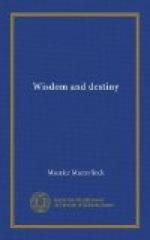29. To say “this is reasonable” is by no means the same as to say “this is wise.” The thing that is reasonable is not of necessity wise, and a thing may be very wise and yet be condemned by over-exacting reason. It is from reason that justice springs, but goodness is born of wisdom; and goodness, we are told by Plutarch, “extends much further than justice.” Is it to reason or wisdom that heroism should be ascribed? Wisdom, perhaps, is only the sense of the infinite applied to our moral life. Reason, it is true, has the sense of the infinite also, but dare not do more than accord it bare recognition. It would seem opposed to the very instinct of reason to regard the sense of the infinite as being of importance in life; but wisdom is wise in the measure that the Infinite governs all she procures to be done.
In reason no love can be found—there is much love in wisdom; and all that is highest in wisdom entwines around all that is purest in love. Love is the form most divine of the infinite, and also, because most divine, the form most profoundly human. Why should we not say that wisdom is the triumph of reason divine over reason of man?
30. We cannot cultivate reason too fully, but by wisdom only should reason be guided. The man is not wise whose reason has not yet been taught to obey the first signal of love. What would Christ, all the heroes, have done had their reason not learned to submit? Is each deed of the hero not always outside the boundary of reason? and yet, who would venture to say that the hero is not wiser by far than the sluggard who quits not his chair because reason forbids him to rise? Let us say it once more—the vase wherein we should tend the true wisdom is love, and not reason. Reason is found, it is true, at the root-springs of wisdom, yet is wisdom not reason’s flower. For we speak not of logical wisdom here, but of wisdom quite other, the favourite sister of love.
Reason and love battle fiercely at first in the soul that begins to expand; but wisdom is born of the peace that at last comes to pass between reason and love; and the peace becomes the profounder as reason yields up still more of her rights to love.
31. Wisdom is the lamp of love, and love is the oil of the lamp. Love, sinking deeper, grows wiser; and wisdom that springs up aloft comes ever the nearer to love. If you love, you must needs become wise; be wise, and you surely shall love. Nor can any one love with the veritable love but his love must make him the better; and to grow better is but to grow wiser. There is not a man in the world but something improves in his soul from the moment he loves—and that though his love be but vulgar; and those in whom love never dies must needs continue to love as their soul grows nobler and nobler. Love is the food of wisdom; wisdom the food of love; a circle of light within which those who love, clasp the hands of those who are wise. Wisdom and love are one; and in Swedenborg’s Paradise the wife is “the love of the wisdom of the wise.”




